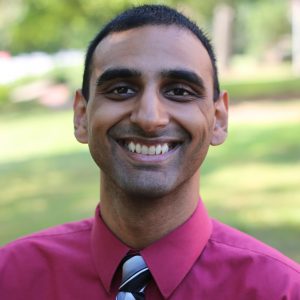September 29, 2020
 When Aaron Devanathan, Pharm.D., arrived at the UNC Eshelman School of Pharmacy in 2017, his advisor, Dean Angela Kashuba, asked him to look inward before he got to work.
When Aaron Devanathan, Pharm.D., arrived at the UNC Eshelman School of Pharmacy in 2017, his advisor, Dean Angela Kashuba, asked him to look inward before he got to work.
“Think about what your legacy is going to be,” she said.
After much thought, the Ph.D. student had an answer: “My personal mission is to serve others.”
He’s doing so both professionally and personally. His most recent effort began October 2016 when he started saving money each month to one day donate to charity: water, a nonprofit bringing clean and safe drinking water to people in developing countries.
This year, Devanathan was able to donate $12,500 of his savings to the nonprofit to build a community water well with a hand pump in Malawi. Devanathan said he chose Malawi to build the well because the UNC Eshelman School of Pharmacy already invests resources there, sending students on month-long pharmacy rotations to three health care institutions in Malawi.
“In the time that I have known Aaron, he is always looking for ways to contribute his talents for the greater good. Whether that is donating platelets regularly, or volunteering for teaching and mentoring activities for our Pharm.D. and Ph.D. students,” Kashuba said. “His focus on ‘paying it forward’ is unlike any student I have ever known. This latest donation is an example of the change a single person can make in this world.”
According to charity: water, Malawi is one of Africa’s most densely populated and least developed countries. Of the 18.6 million people living in the country, nearly 35 percent lack access to water. As a result, often women and children spend hours of their day walking to collect it.
“charity: water’s work would not be possible without our generous community of more than a million donors who have enabled us to bring clean water to 11 million people in need around the world. The water crisis is a solvable problem, and every single person has the power to make a difference,” said Anna Stock-Matthews, head of communications at charity: water.
Malawi is also among the worst hit in the long-running drought in Southern Africa caused by El Nińo. Since 80 percent of the population is employed in agriculture, the effects of the drought are particularly pervasive, according to the nonprofit. Access to clean drinking water and improved sanitation can also help reduce malnutrition and water-related disease among children.
Devanathan said charity: water will work with their partner, World Vision, to build the well for a community of 200 people in Central Malawi. They will then train local water management committees and caretakers responsible for the upkeep and maintenance of the community’s water pump. They also encourage positive hygiene habits through a series of sanitation and health trainings.
The project is anticipated to begin in July and Devanathan will receive updates at six months and 12 months, followed by a completion report after 21 months.
When Devanathan isn’t saving dollars to help others in developing countries, he’s devoting his time to researching the treatment of HIV in the School’s Division of Pharmacotherapy and Experimental Therapeutics. He’s focused on the distribution of antiretroviral drugs within active HIV reservoirs (specifically the spleen), an area of interest toward finding a cure for the virus.
As for the future, he said, “Helping others has always been in my heart. When I see those who need help, I can’t ignore it.”
Latest News

Dean Angela Kashuba receives Carolina Alumni Faculty Service Award

RASP poster presentations capture student research


